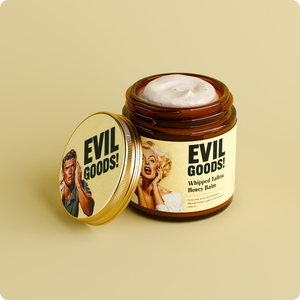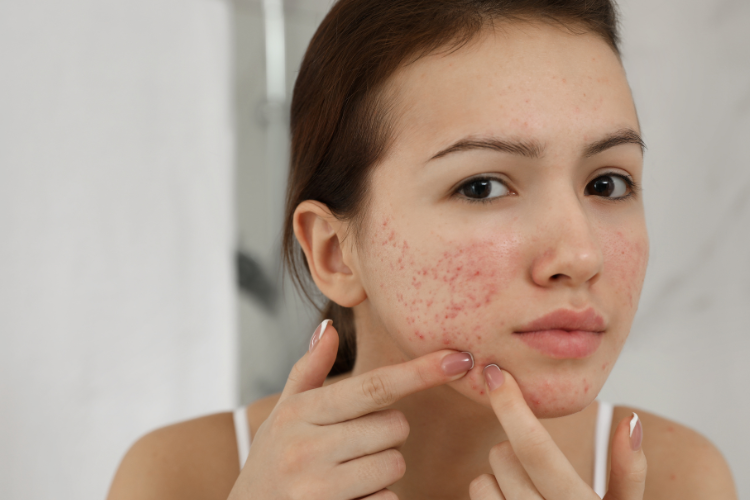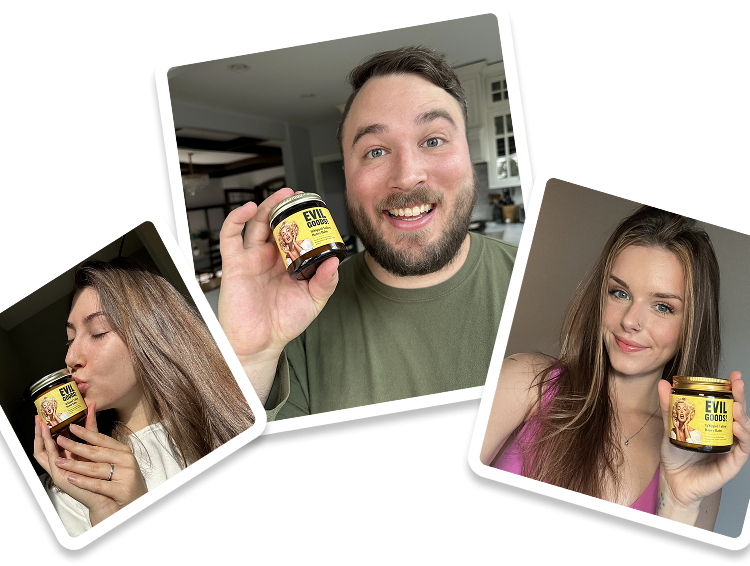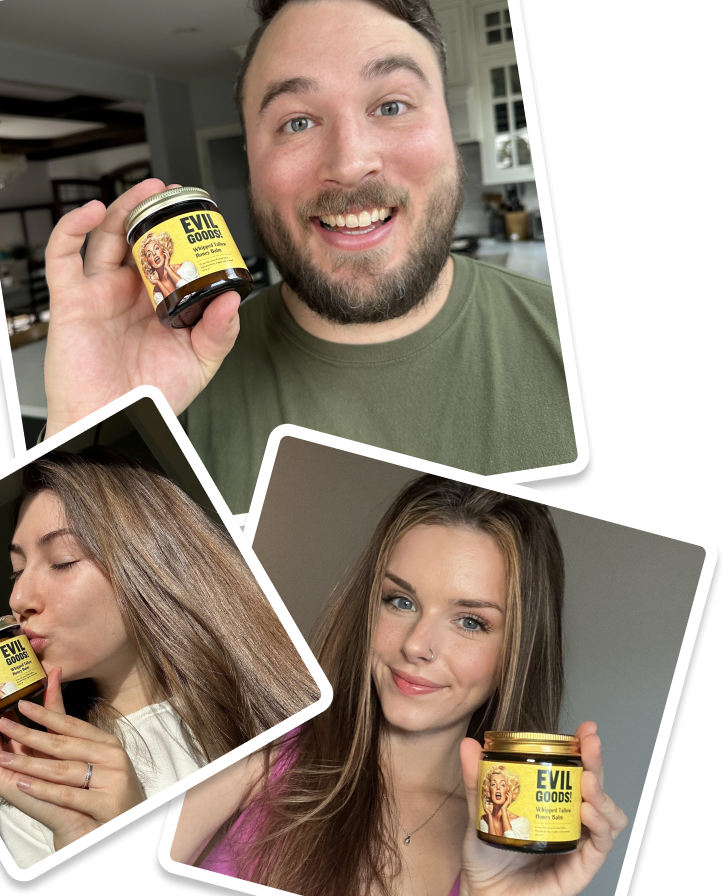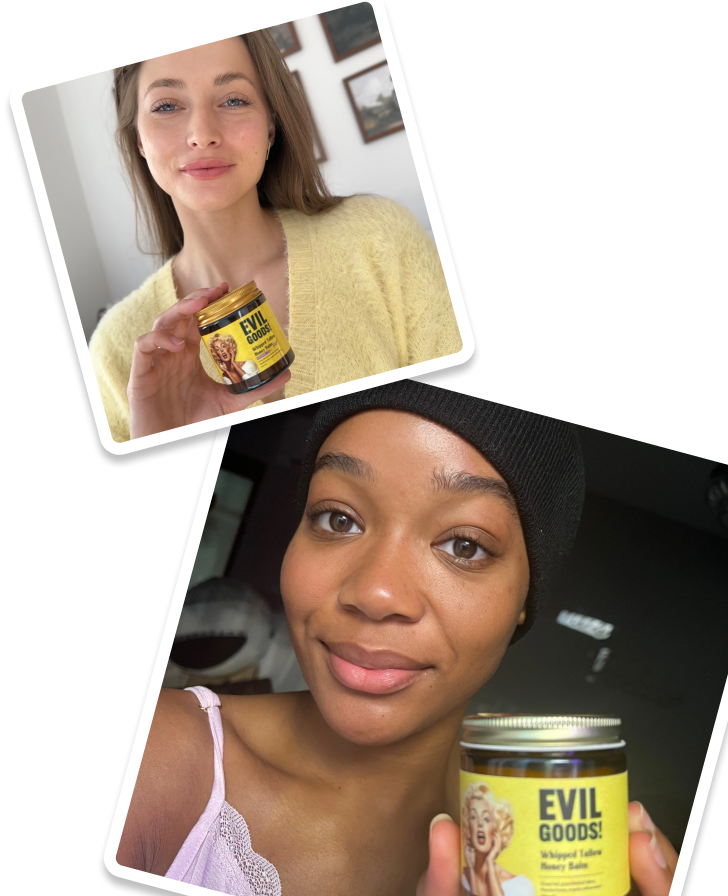Evil Goods!According to the American Academy of Dermatology, acne affects 50 million Americans annually. A 2018 study in the Journal of the American Academy of Dermatology further estimates that acne affects 9.4% of the global population. Unfortunately, we often have to deal with acne symptoms like cysts and blackheads, which are some of the most common skin problems today. Additionally, there are so many remedies for acne that it has become difficult to tell which ones really work.
Acne also affects the way we feel emotionally. The appearance of acne on the skin leads to feelings of self-consciousness, embarrassment, and frustration. The disease makes you feel bad, and it hurts your self-esteem. The best part is you still have solutions. Acne is not a fixed or permanent condition. You can manage it effectively and bring it to a state where it's no longer an active problem.
In this article, we'll explain what acne is, its underlying causes, natural home remedies, and the lifestyle changes that can improve your skin health. If you’ve been seeking solutions on how to treat acne naturally, this guide is for you. You’ll finally be able to manage acne and its scars with the resources we provide below.
What is Acne?
Acne, or acne vulgaris (common acne), occurs when your hair follicles become clogged with oil and dead skin cells, leading to frustrating breakouts. The process starts in your skin's sebaceous glands. These glands produce a natural oil called sebum, which keeps your skin and hair moisturized.
When your skin's sebaceous glands are overly active, they produce too much oil, and the excess, together with dead skin cells, becomes stuck in your pores, causing blockage. This clogged environment makes it possible for bacteria like Propionibacterium acnes (P. acnes) to thrive. This leads to inflammation and the formation of different types of blemishes, such as:
-
Blackheads and Whiteheads: Clogged pores that haven't become inflamed.
-
Pimples and Pustules: Red, inflamed spots that are often filled with pus.
-
Cysts and Nodules: More severe, painful breakouts that form deep beneath the skin.
Understanding this process is the first step toward finding effective solutions to manage your skin. This is because you must use a combination of strategies to deal with each link in the acne chain reaction.
For example, a holistic routine combines solutions that address each part of the process, as follows:
-
Controlling Excess Oil that Clogs Pores: Make lifestyle changes like adopting a low glycemic diet.
-
Fighting Acne-Causing Bacteria: You can use natural treatments with antibacterial properties, like tea tree oil.
-
Calming Inflammation and Reducing Redness: Use soothing remedies like zinc supplements.
When you understand the science behind your breakouts, you can build a personalized and effective routine that clears and maintains healthy skin.
Other Types of Breakouts Besides Acne Vulgaris

Acne vulgaris is the most common form of acne, but there are other types of breakouts. Understanding the differences can help you better identify your specific skin concerns, regardless of whether you have oily skin, dry skin, or a combination.
It’s also important to note that adult acne is a more persistent form of acne vulgaris. People use this term to describe acne vulgaris that occurs in individuals who are 25 years of age or older.
Note that acne is a common skin condition, but it comes in many different forms. While you might be familiar with pimples, other types of acne include:
-
Acne Conglobata: An uncommon but highly severe type of acne. It’s characterized by huge, painful, and interconnected lumps that can leave deep scars on your skin.
-
Acne Mechanica: This type of acne occurs when your skin comes in contact with pressure, friction, or rubbing. Athletes often experience this issue when wearing tight, synthetic clothing or using sports equipment.
-
Acne Rosacea: Rosacea is a persistent skin disorder that people sometimes confuse with acne. It causes your face to redden and makes blood vessels visible. It also results in red, pus-filled bumps that look like pimples.
-
Drug-Induced Acne: Certain drugs, such as steroids and anticonvulsants, can cause rashes on your skin that resemble acne.
Common Acne Triggers
-
Hormones: Changes in hormones, particularly during puberty, menstruation, pregnancy, or disorders like polycystic ovarian syndrome (PCOS), increase sebum production. This excess oil clogs pores and causes hormonal acne to flare up.
-
Medications: Some drugs, like corticosteroids, anticonvulsants, and lithium, can trigger acne as a side effect.
-
Lifestyle Factors: Stress, smoking, and wearing tight clothes may all make acne worse. Stress, in particular, can affect your hormone levels, which trigger an increase in oil production that worsens acne.
-
Genetic Factors: If members of your family had acne, you are more likely to have acne-prone skin. Traits you got from your parents can make your skin more susceptible to excessive sebum production and clogged pores.
Popular Natural Acne Treatments
Now, let’s explore some of the most effective natural anti-acne solutions.

Apple Cider Vinegar
-
Pros: Apple cider vinegar (ACV) is affordable and easy to find. It contains astringent characteristics that help tighten pores and improve acne scars over time.
-
Cons: There isn't a lot of scientific evidence that apple cider works as a treatment for acne. In addition, using it undiluted might irritate or burn the skin.
-
How to Use: Dilute ACV with water (1:3 ratio) and apply it to your skin using a cotton ball. Always do a patch test before applying it to larger areas.
Zinc Supplements
-
Pros: There's a lot of evidence that supports zinc's ability to reduce inflammation and promote the healing of acne (Cervantes et al., 2021). Even older research from Binic et al. (2014) shows that taking zinc supplements helps decrease acne and slowly fades blemishes.
-
Cons: Oral zinc upsets some people's stomachs, and there is no proof that it works when used topically.
-
How to Use: Take zinc supplements with food to keep your stomach from getting upset. For safety, stick to the recommended dosage.
Honey Masks
-
Pros: Raw honey is naturally antibacterial and soothing. It's a great option for calming inflamed skin.
-
Cons: Although its anti-inflammatory properties are helpful, there isn't a lot of strong evidence showing that it can directly treat acne.
-
How to Use: Apply raw honey on your skin as a mask. Leave it for 10-15 minutes, rinse off with warm water. Check out the best honey for your skin health.
Tea Tree Oil
-
Pros: Tea tree oil has strong antibacterial and anti-inflammatory properties that help kill bacteria and reduce inflammation.
-
Cons: Tea tree oil can be drying, and you should never put it directly on your skin. It's also important to note that the FDA hasn't approved essential oils, such as tea tree oil, for treating acne.
-
How to Use: Mix tea tree oil with water in a 1:9 ratio and apply it as a spot treatment using a cotton swab. Keep it on all night.
Green Tea
-
Pros: Green tea contains antioxidants, which reduce inflammation and lower sebum production, a major cause of acne.
-
Cons: There isn't much research that proves green tea can cure acne, even if it's beneficial for you.
-
How to Use: Brew a cup of green tea, let it cool, then use a cotton ball to put it on your skin. You can also add green tea extract to your skin care products.
Witch Hazel
-
Pros: Witch hazel is a natural astringent that helps calm down irritated and inflamed skin. It's often found in skincare products.
-
Cons: There isn't much research on its direct effect on acne. Therefore, its effectiveness remains unclear.
-
How to Use: Apply witch hazel to your skin as a toner or spot treatment. Make sure you patch-test first.
Aloe Vera
-
Pros: Aloe vera is soothing and helps reduce inflammation. It’s an ingredient in many skincare products. You can use it with other treatments as well.
-
Cons: There’s limited research on its effects on acne, but it can still help your skin heal.
-
How to Use: After washing your face, apply pure aloe vera gel to it.
Fish Oil Supplements (Omega-3s)
-
Pros: Omega-3 fatty acids like eicosapentaenoic acid support skin health and fight inflammation. They reduce acne flare-ups by lowering the body's inflammatory response.
-
Cons: You won't see results on time because the effect may not be immediate.
-
How to Use: Take omega-3 supplements or eat more foods that are high in omega-3s, including fatty fish, walnuts, or flaxseeds.
Brewer’s Yeast
-
Pros: Early research has shown that Brewer's yeast is a therapeutic agent for treating acne, with one study finding significant improvement in the majority of participants (Weber et al., 1989). More recent research suggests that Brewer's yeast has an inhibitory effect on the bacteria that cause acne breakouts (Irzoqy et al., 2024). According to Moyad. (2007), Brewer's yeast is a rich source of B vitamins and minerals that are essential for your skin health.
-
Cons: It causes side effects like gas and bloating.
-
How to Use: People usually take brewer's yeast as a supplement. Always consult a healthcare provider before you use a new supplement.
Exfoliation
-
Pros: Exfoliation removes dead skin cells. It keeps your pores from getting clogged and prevents acne development.
-
Cons: Be careful with harsh scrubs and try not to over-exfoliate, as this can irritate your skin.
-
How to Use: Use a gentle scrub (physical exfoliants) once or twice a week. For better results, consider introducing chemical exfoliants like glycolic acid or salicylic acid.
Evil Goods: Tallow and Honey Balm

At Evil Goods, we believe that the best way to take care of your skin is to nourish it. That's why we carefully formulated our Tallow and Honey Balm, an effective moisturizer that works well with your skin.
We use grass-fed beef tallow because its fatty acid profile is similar to the natural oils your skin produces, which makes it easy to absorb. We then add raw honey, a natural humectant that draws moisture to the skin and soothes it.
This combination makes our range of beef tallow skin products rich, yet gentle moisturizers that work on even the driest skin. Our natural face moisturizers are also good for sensitive skin because they don't have any harsh chemicals, perfumes, or irritants. We have a gentle option for people with acne-prone skin that nourishes without stripping, helping to calm and promote the natural health of your skin.
Natural Solutions for Acne Scars and Post-Inflammatory Hyperpigmentation

After an active breakout has healed, it often leaves behind a lasting mark. You need to know the difference between a real acne scar and post-inflammatory hyperpigmentation (PIH). True scars are permanent changes in the skin's texture that will not go away without professional treatments. These treatments include laser therapy, chemical peels, or microneedling.
PIH, on the other hand, refers to the flat, discolored marks that remain after a pimple has healed. It's temporary and can fade off on its own with time, or you can use the following ingredients to improve your overall skin tone:
Vitamin C
This strong antioxidant is an important part of any routine aimed at lightening dark spots. Vitamin C brightens the skin by suppressing the development of melanin, the pigment responsible for discoloration. It also helps the body make more collagen, which can improve your skin's texture over time. Look for a natural vitamin C product like a serum.
Licorice Root Extract
Licorice root is a common ingredient in many natural brightening products. It contains compounds that help to reduce the production of melanin in the skin. It also has anti-inflammatory and calming effects, making it an excellent choice for irritated skin.
Rosehip Oil
This oil is rich in essential fatty acids and natural Vitamin A (a type of retinol), both of which help the skin heal. Rosehip oil removes dark spots and can improve your skin's texture.
Gentle Exfoliation
Regular exfoliation is important for removing dead skin cells and allowing new, healthy cells to come to the surface. You can try using gentle chemical exfoliants that are in some natural products, such as those with fruit enzymes from papaya or pineapple, rather than harsh physical scrubs.
Sun Protection
This is probably the most important thing you can do to stop dark spots from getting worse. UV exposure increases melanin production, which makes PIH darker and harder to fade. Always wear a broad-spectrum sunscreen, even on cloudy days. Our tallow sunscreen cream deeply moisturizes and protects your skin from UV rays.
Lifestyle Changes That Prevent Future Acne Breakouts
In addition to topical treatments, there are several lifestyle adjustments you can make to reduce acne breakouts naturally.
Low-Glycemic Diet
A diet with a low glycemic index helps prevent acne from getting worse by lowering insulin spikes that increase sebum production. Recent research has confirmed that low-glycemic-load diets significantly reduce acne lesions, and as such, healthcare providers should consider complementary therapy for patients with acne (Chen et al., 2020). The connection between diet and acne is now understood in more detail. A recent review explains how a high-sugar diet can lead to elevated insulin levels, which in turn increase oil production and inflammation (He & Fan, 2022).
While peer-reviewed studies have found a clear correlation between blood sugar and acne, the individual effects of a low glycemic diet can be challenging to track. This means that it can be tough for a single person to definitively say, "My skin is clear because of this diet." This is because a person's acne is influenced by countless factors, including stress, hormones, the products they use, sleep, and genetics. It's nearly impossible for one person to isolate the exact effect of their diet from all these other variables.
Therefore, eat a lot of fruits, veggies, beans, and whole grains. Avoid foods that are high in sugar and refined carbohydrates.
Cut Back on Dairy
A systematic review and meta-analysis confirmed that dairy intake is positively associated with an increased risk of acne (Aghasi et al., 2019). This connection is often more pronounced in certain types of dairy, like eggs, and the effect can vary widely among individuals.
Recent research has also found a strong correlation between the consumption of milk, especially skimmed milk, and the onset of acne (Fabbrocini et al., 2020). The prevailing theory is that skimmed milk and whey protein can influence the hormones in our bodies, such as insulin and the insulin-like growth factor 1 (IGF-1), which causes acne development.
Stress Management
Stress management can help regulate hormone levels that keep acne from getting worse. When you're stressed, your body produces more stress hormones like cortisol and androgens. These hormones can cause your skin's oil glands to produce more sebum, making acne worse.
Research has confirmed the connection between stress and acne and has also explored the underlying biological mechanisms. A study published in the International Journal of Environmental Research and Public Health found that stress can increase certain inflammatory molecules in the skin, which then promotes breakouts (Riad et al., 2020).
Exercise
Regular exercise can improve hormone regulation, reduce stress, and increase circulation, all of which benefit your skin.
Hormonal fluctuations in adults and teenagers can trigger excess oil production in the skin's glands, leading to acne. Exercise can help prevent these triggers by keeping these hormones in balance.
Exercise doesn't directly treat acne, but it supports your body's natural ability to manage hormonal and inflammatory issues that cause breakouts.
Hydration
Staying hydrated helps your skin regenerate and heal better. Your skin's outermost layer, the skin barrier, is your body's protector. Proper hydration keeps this barrier strong and supple, protecting it from external irritants and bacteria. When the skin is dehydrated, this barrier can become weak, making you more vulnerable to inflammation and breakouts.
This may seem counterintuitive, but when your skin is dehydrated (lacking water), it can sometimes overcompensate by producing more oil to moisturize itself. This excess oil can then lead to clogged pores and breakouts. However, you can help regulate oil production by keeping your skin well-hydrated.
When to Seek Professional Help

Natural treatments can help with mild to moderate acne. Severe acne may require professional intervention. If your acne hurts, persists, or leaves stubborn scars or dark areas, you should see a dermatologist.
A dermatologist can give you prescription treatment options, including oral antibiotics, topical retinoids, chemical peels, or hormonal therapy. They can also recommend medications like benzoyl peroxide.
A dermatologist might be what you need to get your acne under control.
FAQs About Acne
How Do I Treat Acne in Children?
Gentle skin care products and natural therapies often help with acne in kids. If the problem is worse, see a pediatric dermatologist.
How Do I Get Healthy, Clear Skin Naturally?
If you want healthy, clear skin, stay hydrated, eat a balanced diet, manage stress, and use natural remedies like tea tree oil and aloe vera. When it comes to skin care products, for your body, use natural body lotions, and for your face, organic face moisturizers.
What is the Strongest Natural Antibiotic for Acne?
When applied correctly, tea tree oil helps get rid of acne naturally because it has inherent antimicrobial properties that are effective in treating skin irritation.
Final Thoughts on Acne and Natural Solutions
Acne is a common skin condition, but it doesn’t have to define your skin health. With natural acne solutions like tea tree oil and zinc supplements, you can reduce inflammation. Results may take time, but changes in your lifestyle, like eating a balanced diet, managing stress, and drinking enough water, will aid your skincare routine and make your skin cleaner and healthier. If your acne gets worse, and you’re uncertain about a treatment, consult a dermatologist.
Further research from medical journals is ongoing. Luckily, natural acne treatments are effective, but always be patient and consistent.
References
-
Aghasi, H., Aghasi, H., & Fabbrocini, G. (2019). Dairy intake and acne vulgaris: a systematic review and meta-analysis of 14 observational studies. Clinical Nutrition, 38(5), 1836–1846.
-
American Academy of Dermatology. (n.d.). Acne: Who gets and causes.
-
Binic, I., Jankovic, A., Gligorijevic, J., & Gligorijevic, J. (2014). Oral zinc for acne vulgaris: A systematic review. Indian Journal of Dermatology, 59(1), 12.
-
Cervantes, J., Eber, A. E., Perper, M., Nascimento, V. M., Nouri, K., & Keri, J. E. (2021). An open-label study comparing oral zinc to lymecycline in the treatment of acne vulgaris. The Journal of Clinical and Aesthetic Dermatology, 14(5), 56–60.
-
Fabbrocini, G., Cacciapuoti, S., Cacciapuoti, S., & Cacciapuoti, S. (2020). Diet and acne: A comprehensive review of the literature. Giornale Italiano di Dermatologia e Venereologia, 155(5), 524-531.
-
Irzoqy, M. E., Sultan, S. J., & Abdallah, O. D. (2024). Inhibitory Effect of Saccharomyces cerevisiae Against Propionibacterium acnes. Journal of Bioscience and Applied Research, 10(3), 385-391.
-
Moyad, M. A. (2007). Brewer's yeast. In P. D. S. (Ed.), The American Academy of Family Physicians Family Health and Wellness Resource.
-
Riad, S. D., El-Feky, S. A., El-Feky, S. A., & El-Feky, S. A. (2020). The effect of psychological stress on the pathogenesis of acne vulgaris: A systematic review. International Journal of Environmental Research and Public Health, 17(18), 6610.
-
Vos, T., et al. (2018). The global burden of acne. Journal of the American Academy of Dermatology, 78(1), 1-13.
-
Weber, G., Adamczyk, A., & Freytag, S. (1989). Treatment of acne with a yeast preparation. Fortschritte der Medizin, 107(26), 567-570.

Dr. Elena Dinkollari
MD, Dermatologist & Endocrinology Assistant
Doctor Approved
